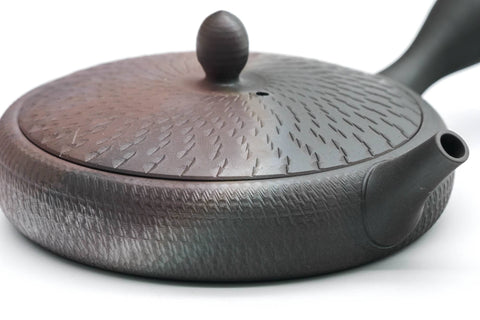








Wide Flat Kokudei Yōhen Tokoname Teapot - 100ml
GyokkoThis expertly crafted hira-gata Tokoname-yaki kyusu (teapot) is made from Tokoname kokudei (黒泥) clay, which has the same properties as the iconic red shudei (朱泥) but is fired in reduction producing a deep black. Yōhen (窯変), which means "changed by the kiln", refers to the attractive gradient from bronze/brown to black across the pot caused by specific firing conditions.
This kyusu's wide, flat shape and small size are specially designed to promote even contact between the leaves and the water, aiding the extraction of umami from high-grade sencha and gyokuro. It boasts a wide top opening so you can watch the leaves unfurl as they steep and clean them out more easily. This shape's sharp corners are prone to cracking under stress during the throwing and firing processes, so only extremely talented artisans can create them consistently.
The teapot's built-in ceramic sasame filter is perfect for naturally straining tea. Please note: A flat kyusu requires very gentle and slow pours to avoid leaks around the lid. It takes a bit of practice to get familiar with compared to the larger, rounder kyusu with a more elevated spout.
This piece was made by the highly-respected Gyokko (玉光) Kiln, manned by the master potters of the Umehara family. As these are handmade pieces, there may be slight variations in the shape and colouration.
Made in Japan. Ships from the United States.
Width: 15.5 cm (6.1 in) (including handle)
Height: 4.5 cm (1.8 in)
Capacity: 100 ml
Tokoname-yaki (常滑焼) is a type of Japanese pottery that traditionally comes from Tokoname in Aichi Prefecture, Japan. The site of one of Japan’s Six Ancient Kilns, pottery has been made in Tokoname since the 12th century.
Today, Tokoname ware is known for its iconic brick-red clay called shudei. Famously used in teaware and bonsai pots, this clay’s vibrant colour comes from its rich iron content. Tea steeped in unglazed Tokoname teapots is said to have a mellower taste.

Yōhen is used to generally describe many kiln effects across various ceramics styles (including Tenmoku, where it is spelled 曜変). In Tokoname-ware, however, this term specifically refers to the attractive and often dramatic colour gradients and patches caused by certain firing conditions. One way this is achieved is by partially submerging the teapot in sawdust while firing. Yōhen pots typically have a gradient from a dark black or brown to shudei red, though some potters use this technique with ryokudei or koudei clays to produce unique colour patterns. As the exact pattern produced is highly dependent on the position of the piece in the kiln as well as the firing temperature, atmosphere, and fuel, producing a consistent result across many pieces takes a great amount of skill, patience, and practice.

Headed by second generation kiln leader Umehara Hirotaka (梅原廣隆), the Gyokko workshop team consists of the Umehara family and their coworkers who work together to create some of the most affordable handmade Tokoname kyusu. By dividing the work between multiple craftspeople, Gyokko can produce incredibly consistent and beautiful pieces on a larger scale, without having to resort to using moulds, thereby allowing more people to appreciate handmade ceramics.

Our Teas








































